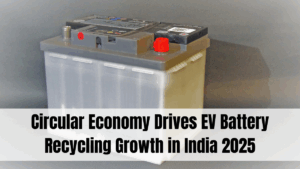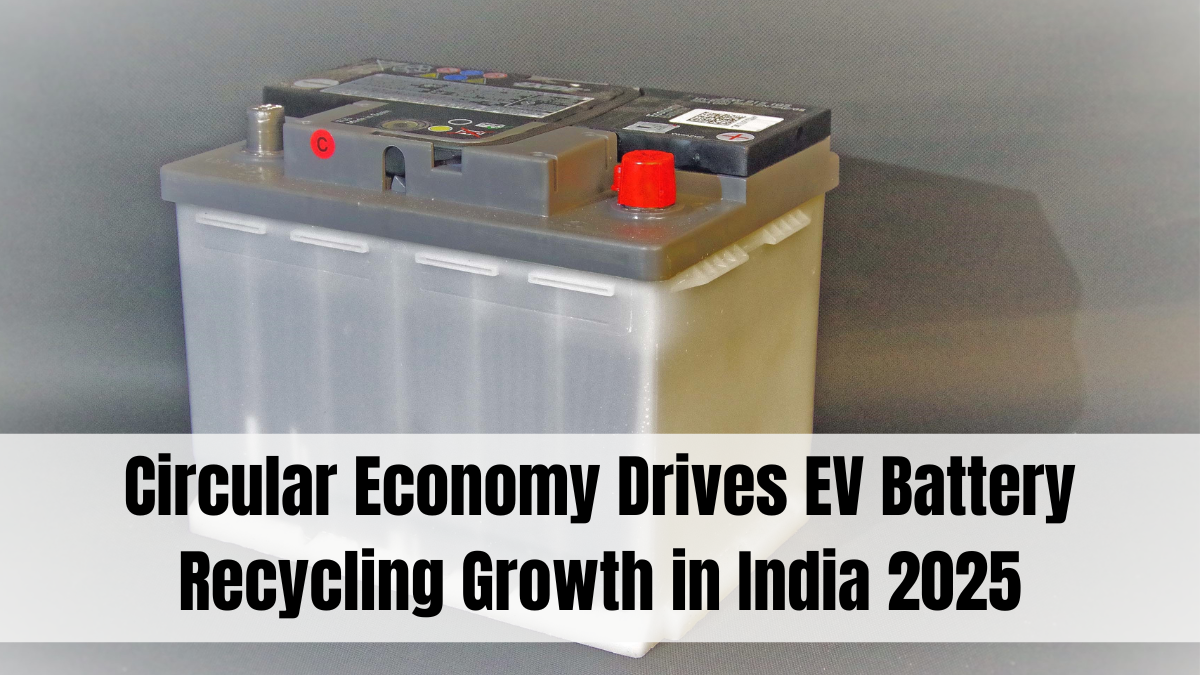As electric vehicles (EVs) gain momentum in India, managing the lifecycle of EV batteries sustainably has become a top priority. The adoption of circular EV battery recycling 2025 models is driving innovations that reduce waste, recover valuable materials, and lower environmental impact, positioning India as a leader in green mobility.
This article explores the emerging circular economy frameworks for EV battery recycling, the technologies involved, government initiatives, challenges, and future opportunities.

Understanding Circular Economy in the Context of EV Batteries
The circular economy is a sustainable model aimed at minimizing waste and maximizing resource use through reuse, refurbishment, and recycling. Applied to EV batteries, it means:
-
Recovering valuable metals like lithium, cobalt, and nickel after batteries reach end-of-life.
-
Designing batteries for easy disassembly and material recovery.
-
Promoting second-life applications such as stationary energy storage before recycling.
-
Reducing raw material extraction and carbon footprint associated with battery production.
This shift from linear “take-make-dispose” to circular “reduce-reuse-recycle” is critical for sustainable EV adoption.
Advances in EV Battery Recycling Technologies in India
-
Hydrometallurgical Processes: Using chemical solutions to extract metals with higher recovery rates and lower environmental risks.
-
Pyrometallurgical Methods: High-temperature smelting to recover metals, still in use but being optimized for efficiency.
-
Direct Recycling: Emerging techniques that refurbish cathode materials directly, reducing energy use.
-
Modular Battery Design: New EV batteries designed for easier recycling and second-life use.
-
AI-Enabled Sorting: Smart automation to separate battery components accurately, improving recycling yields.
These technologies form the backbone of India’s growing EV battery recycling sector.
Government Policies and Incentives Supporting Circular EV Battery Recycling
-
The Ministry of Heavy Industries and Public Enterprises released guidelines on battery recycling and second-life use.
-
Financial incentives and subsidies for setting up recycling plants are available under schemes like Faster Adoption and Manufacturing of Hybrid and Electric Vehicles (FAME-II).
-
Extended Producer Responsibility (EPR) mandates require manufacturers to manage battery end-of-life.
-
Collaborations with international partners and startups to bring best practices and technologies.
Government backing accelerates infrastructure development and industry participation.
Leading Indian Startups and Companies in EV Battery Recycling
-
Exigo Recycling: Pioneering advanced battery recycling with hydrometallurgical methods.
-
Attero Recycling: Expanding capacity to include EV battery waste alongside e-waste.
-
Tata Chemicals: Developing recycling technology tailored to lithium-ion batteries.
-
Indian Oil Corporation: Exploring second-life battery applications and recycling partnerships.
-
New Ventures: Multiple startups focused on AI-driven sorting, battery refurbishment, and sustainable materials.
These players drive innovation and scale in the circular economy ecosystem.
Challenges in Scaling EV Battery Recycling in India
-
Infrastructure Deficit: Limited recycling facilities and collection systems for spent batteries.
-
Regulatory Gaps: Need for uniform policies and enforcement across states.
-
Technical Complexity: Diverse battery chemistries require different recycling approaches.
-
Cost Considerations: High initial investment and operational costs pose barriers.
-
Consumer Awareness: Educating EV owners on proper disposal and battery return programs is essential.
Addressing these challenges is vital for sustainable growth.
The Future of Circular EV Battery Recycling in India
-
Growth of second-life battery markets for renewable energy storage solutions.
-
Integration of blockchain for transparent tracking of battery lifecycle and recycling.
-
Increased R&D on biodegradable and recyclable battery materials.
-
Public-private partnerships fostering innovation hubs and training programs.
-
Strengthening of the circular economy through waste-to-resource policies aligned with climate goals.
India’s commitment to sustainable EV adoption hinges on a robust recycling ecosystem.
FAQs
What is circular economy in EV battery recycling?
It is a system focused on reusing, refurbishing, and recycling batteries to minimize waste and maximize resource use.
Are all EV batteries recyclable?
Most lithium-ion batteries can be recycled, but methods vary depending on battery chemistry.
How can consumers participate in battery recycling?
By returning spent batteries to authorized collection centers or manufacturer take-back programs.
Is battery recycling costly?
Recycling requires significant investment but reduces long-term environmental and material costs.
What benefits does circular recycling bring to India?
It reduces dependence on imported raw materials, lowers pollution, and supports sustainable EV growth.
Click here to know more.
